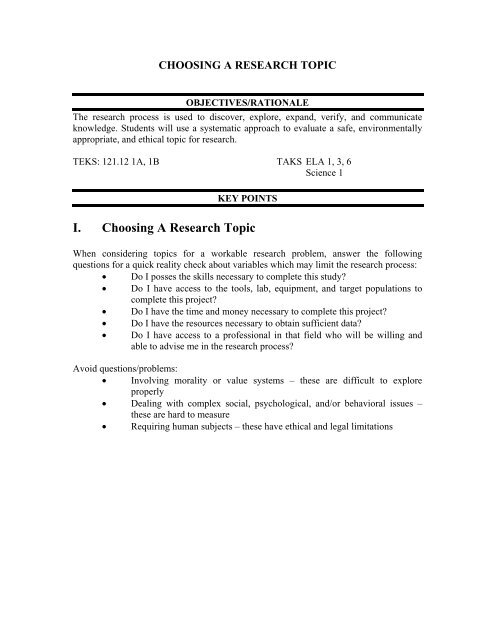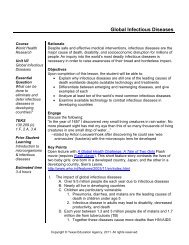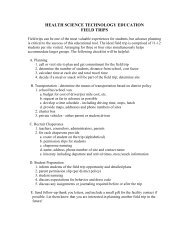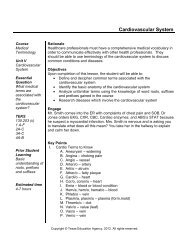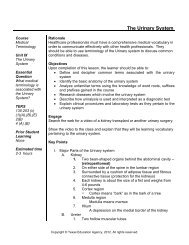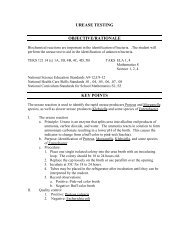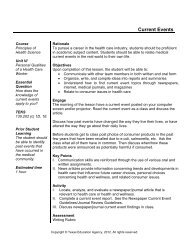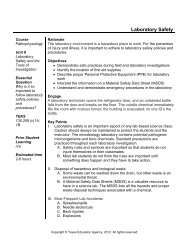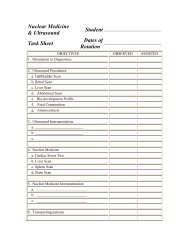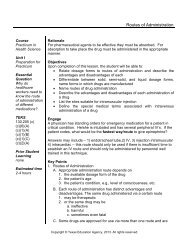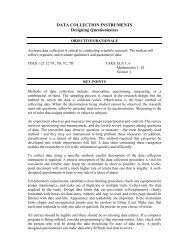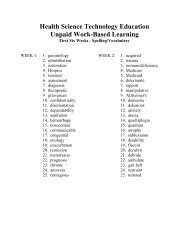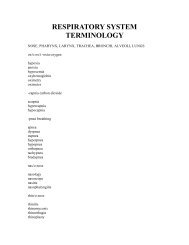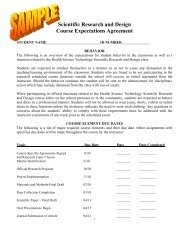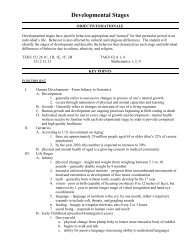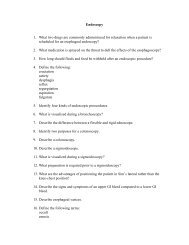CHOOSING A RESEARCH TOPIC
CHOOSING A RESEARCH TOPIC
CHOOSING A RESEARCH TOPIC
You also want an ePaper? Increase the reach of your titles
YUMPU automatically turns print PDFs into web optimized ePapers that Google loves.
<strong>CHOOSING</strong> A <strong>RESEARCH</strong> <strong>TOPIC</strong><br />
OBJECTIVES/RATIONALE<br />
The research process is used to discover, explore, expand, verify, and communicate<br />
knowledge. Students will use a systematic approach to evaluate a safe, environmentally<br />
appropriate, and ethical topic for research.<br />
TEKS: 121.12 1A, 1B TAKS ELA 1, 3, 6<br />
Science 1<br />
KEY POINTS<br />
I. Choosing A Research Topic<br />
When considering topics for a workable research problem, answer the following<br />
questions for a quick reality check about variables which may limit the research process:<br />
• Do I posses the skills necessary to complete this study?<br />
• Do I have access to the tools, lab, equipment, and target populations to<br />
complete this project?<br />
• Do I have the time and money necessary to complete this project?<br />
• Do I have the resources necessary to obtain sufficient data?<br />
• Do I have access to a professional in that field who will be willing and<br />
able to advise me in the research process?<br />
Avoid questions/problems:<br />
• Involving morality or value systems – these are difficult to explore<br />
properly<br />
• Dealing with complex social, psychological, and/or behavioral issues –<br />
these are hard to measure<br />
• Requiring human subjects – these have ethical and legal limitations
Choose a research topic that interests you. Then……….<br />
*Find a study that has already been done and duplicate that study.<br />
Replication is an important part of the research process.<br />
-or-<br />
*Find a study that has already been done and replicate it using new<br />
definitions of some of the variables in the study.<br />
-or-<br />
*Find a study that has already been done and replicate it using<br />
additional moderator or control variables<br />
-or-<br />
*Find an existing study and develop a different way to test the<br />
hypothesis<br />
-or-<br />
*Follow an author’s suggestions for further research needed – usually<br />
found at the end of an article<br />
-or-<br />
*Contact the author of an interesting study using the internet for ideas<br />
for further study<br />
-or-<br />
*Choose a problem, analyze it, and invent a completely new study<br />
-or-<br />
*Use a combination of the above techniques<br />
II.<br />
Identify a Mentor…………<br />
A mentor is:<br />
• Patient - ENJOYS working with and sharing knowledge with<br />
students<br />
• Consistent- willing to help students through the long haul – through<br />
all phases of the research project<br />
• Effective – qualified and knowledgeable on the topic and able to<br />
communicate this knowledge at the level of the student
Where to look for a mentor:<br />
• Community health care workers<br />
• Local hospitals, clinics, and offices<br />
• Local health department<br />
• College or university<br />
• Bibliographies of related articles<br />
• Professional journals<br />
• Ask parents for ideas<br />
• Ask other teachers for ideas<br />
• Ask classmates for ideas<br />
• Yellow pages<br />
• Newspapers<br />
• Internet<br />
http://www-smi.stanford.edu/people/pratt/smi/advice.html- advice about<br />
research and mentors<br />
http://www.ipl.org/teen/aplus/step2.htm - discovering and choosing a topic<br />
http://tax.cch.com/help/welcome.htm - beginning your research<br />
ACTIVITIES<br />
Each student will select a research topic to share with the class. The class will critique the<br />
topic chosen for possible limitations.<br />
Student will choose a mentor for their research project and turn in a signed mentor<br />
agreement.<br />
MATERIALS NEEDED<br />
Topic Choice Rubric<br />
Mentor (Resource Person) Selection Assignment<br />
Mentor Agreement<br />
Safety and Ethics In Research
<strong>TOPIC</strong> CHOICE RUBRIC<br />
STUDENT’S NAME: __________________________________________<br />
Criteria<br />
Student has:<br />
Possible<br />
Points<br />
1 skills necessary to complete project 20<br />
2 access to the tools, lab, equipment, and 20<br />
target populations, to complete this project<br />
3 the time and money necessary to complete 20<br />
this project<br />
4 the resources necessary to obtain sufficient 20<br />
data<br />
5 access to a professional in that field who 20<br />
will be willing and able to advise in the<br />
research process<br />
TOTAL POINTS<br />
(100 possible)<br />
Points<br />
Received<br />
Evaluator Signature: ________________________________ Date: _________________
Mentor (Resource Person) Selection Assignment<br />
Each student shall identify a person to act as a research mentor. This person will assist<br />
in overseeing the research project as well as in the critique of the student and the project.<br />
The mentor may be an instructor but not the research course instructor. The mentor<br />
should be a professional who is knowledgeable about the student’s chosen research topic.<br />
The student must meet with the mentor a minimum of three (3) times each six weeks<br />
once the project has begun (approximately once every two weeks). The meetings will<br />
take place on dates and at locations mutually agreed upon by mentor and student. During<br />
these meetings, the student should obtain documentation from their mentor including:<br />
date, a statement of progress of the project, and the mentor’s signature. Documentation<br />
should be made in the student’s logbook at these meetings. The mentor should also be<br />
asked to include any constructive suggestions or comments that would be helpful to the<br />
student.<br />
The mentor is not responsible for funding any part of the project nor are they responsible<br />
for the preparation of the technical paper or oral presentation.<br />
Student will have the mentor sign the mentor agreement and return the signed agreement<br />
to the research instructor by the determined due date.
MENTOR AGREEMENT<br />
Student Name: _______________________________________________________________________<br />
Student Address: _____________________________________________________________________<br />
Student Home Phone: ________________________Email: ___________________________________<br />
Mentor Name: _______________________________________________________________________<br />
Title _______________________________________________________________________________<br />
Business Address _____________________________________________________________________<br />
______________________________________________________________________<br />
Business Phone: ____________________________Email: ____________________________________<br />
I agree to act as a mentor for the research project this student will complete during the 200_-200_<br />
school year.<br />
I understand that I will serve to advise the student and critique the student’s project.<br />
As a mentor, I understand that I am required to meet with the student at a mutually agreed upon and<br />
convenient location a minimum of three times each six week period in which he/she is collecting data.<br />
During these meetings, I am to document the date, perceived progress of the student’s project, and<br />
include my signature in their logbook.<br />
As a mentor, I understand that I am not responsible for the financial expenses incurred or the design,<br />
implementation, or technical paper preparation for this project. This is the responsibility of the student.<br />
I understand that I may be asked to participate in the evaluation process during the oral presentations. I<br />
agree to participate if given proper notification and my schedule permits.<br />
In the event that I am not able to continue my affiliation with the student, I will give the student and<br />
course instructor 30 days notice prior to my participation termination. I will offer my assistance in<br />
finding another mentor for the student.<br />
Mentor_____________________________________________________________Date: __________________<br />
Student_____________________________________________________________Date: __________________<br />
Parent______________________________________________________________Date: __________________<br />
Instructor___________________________________________________________Date: __________________
SAFETY AND ETHICS IN <strong>RESEARCH</strong><br />
Examination of the ethical implications of a study is vital. Every research study raises a<br />
unique set of ethical issues. However, there are accepted ethical standards that every<br />
researcher should incorporate into their study:<br />
1. respect for study subjects<br />
2. benefits of the research are proportional to any risks assumed by subjects<br />
3. results of the research are disseminated fairly<br />
Research subjects should be regarded as individuals and treated with respect. Study<br />
subjects should always be informed of the purpose of the study. Their written informed<br />
consent to participate in the study should be sought. Their involvement in the study, how<br />
privacy and confidentiality will be guarded, their right to refuse or stop participating, and<br />
the manner in which the data will be used should also be clearly explained. Respect for<br />
study subjects will improve the scientific quality of the research by improving<br />
compliance with the researcher’s requests and instructions.<br />
The well-being of the study subjects should be protected. The research should minimize<br />
any possible risks and maximize the benefits of subjects participating in the study. A<br />
valid research design should be utilized to ensure the benefits of the research are<br />
proportionate to the risks. Study subjects participate in research studies in order to benefit<br />
society as a whole. Therefore, no single group, especially not the disadvantaged,<br />
vulnerable, or minority groups, should be asked to bear a disproportionate share of the<br />
risk.<br />
Any benefits resulting from the research should be disseminated fairly. If the problems<br />
are too complex to deal with in the amount of time allotted, the research proposal should<br />
be modified.<br />
The Department of Health and Human Services has summarized guidelines, as follows, to<br />
ensure that research is conducted in an ethically acceptable manner:<br />
• Risks to subjects are minimized and proportionate to the anticipated<br />
benefits and knowledge<br />
• Data are monitored to ensure the safety of subjects<br />
• Selection of subjects is equitable<br />
• If subjects are vulnerable, additional safeguards are included<br />
• Informed consent is obtained, including:<br />
o Nature of the research study<br />
o Procedures involved in the study<br />
o Potential risks and benefits of the study<br />
o Participation is voluntary<br />
o Confidentiality is protected<br />
o Answers to questions that study subjects have are made available<br />
• Confidentiality is adequately protected


